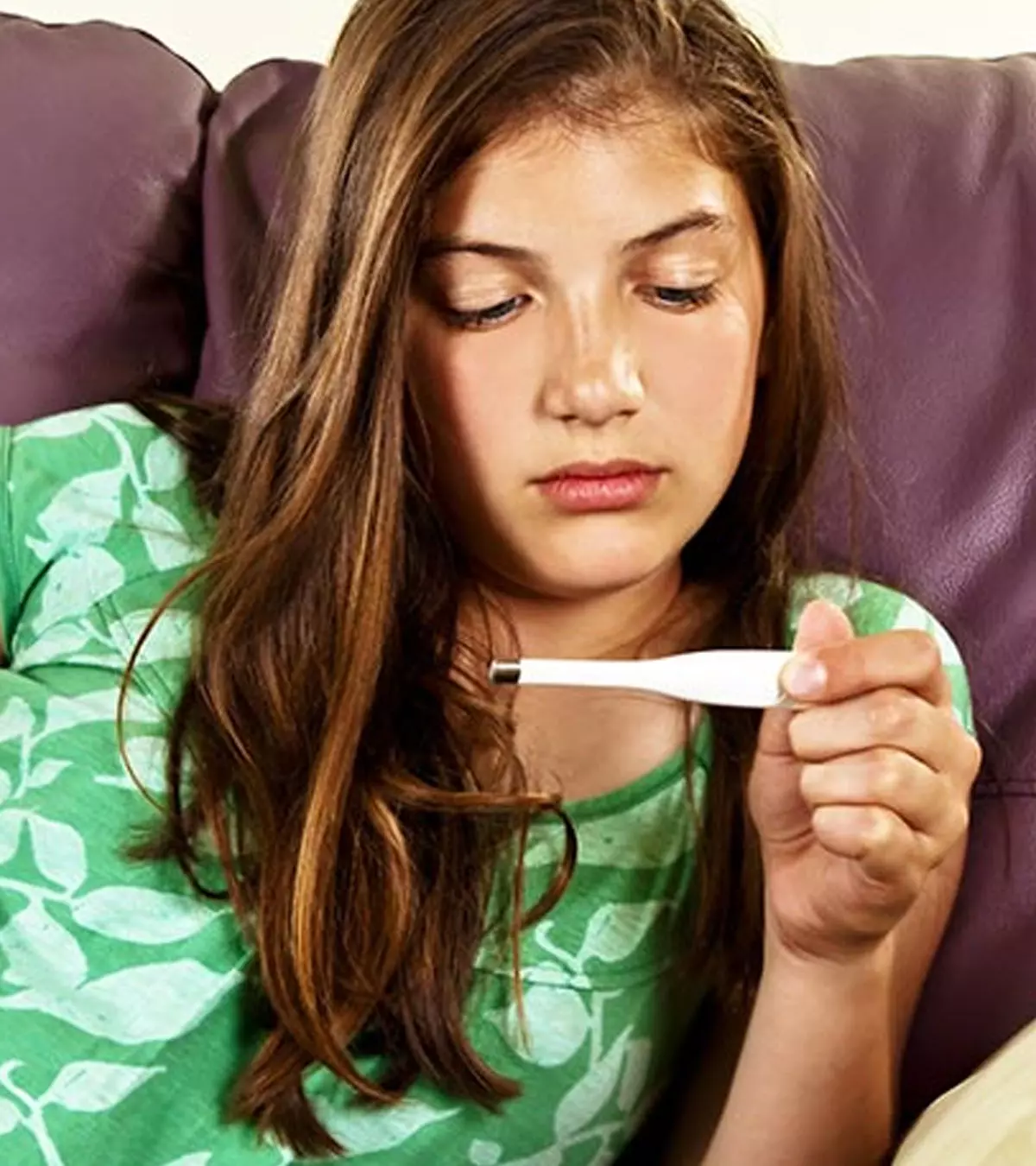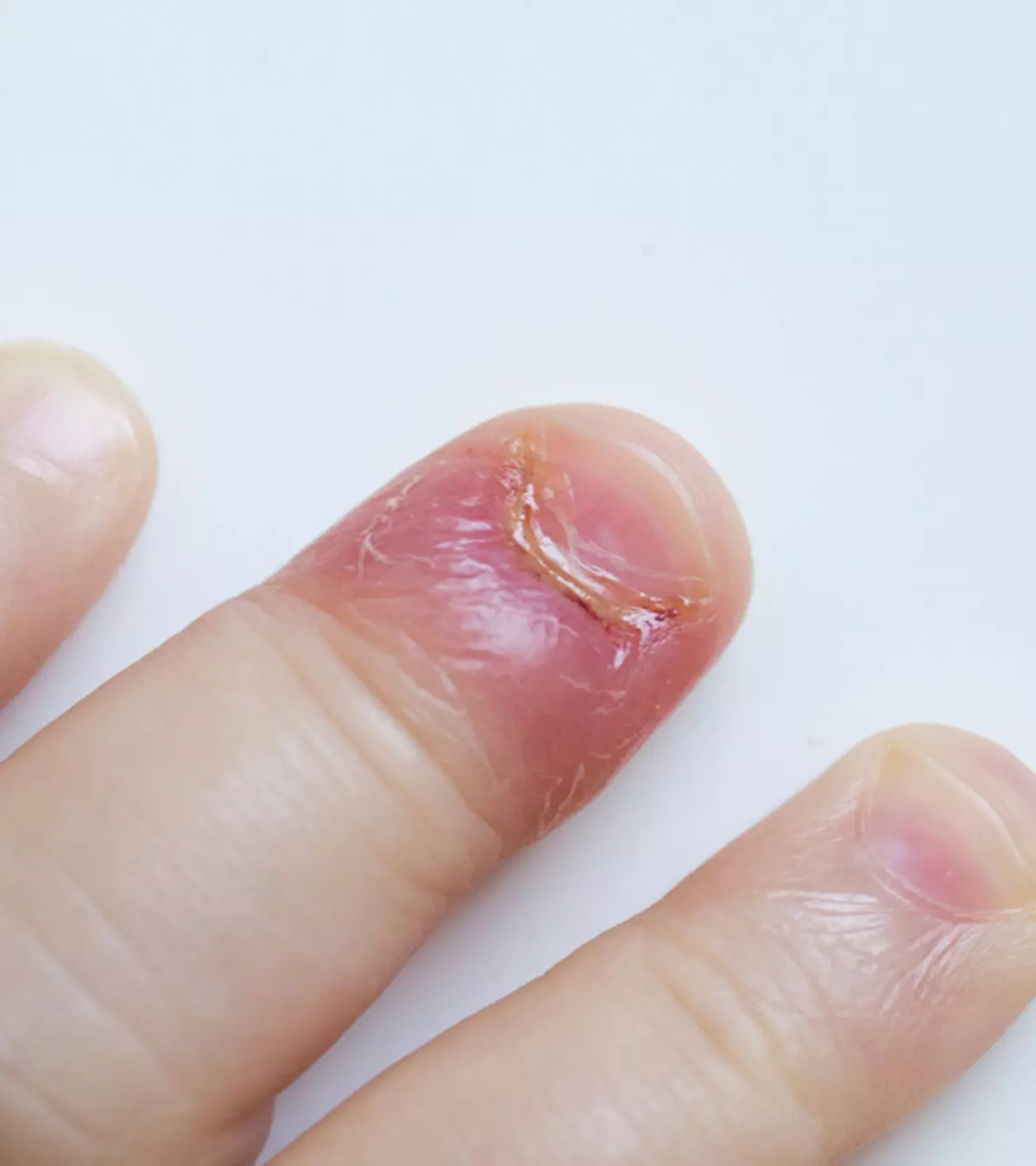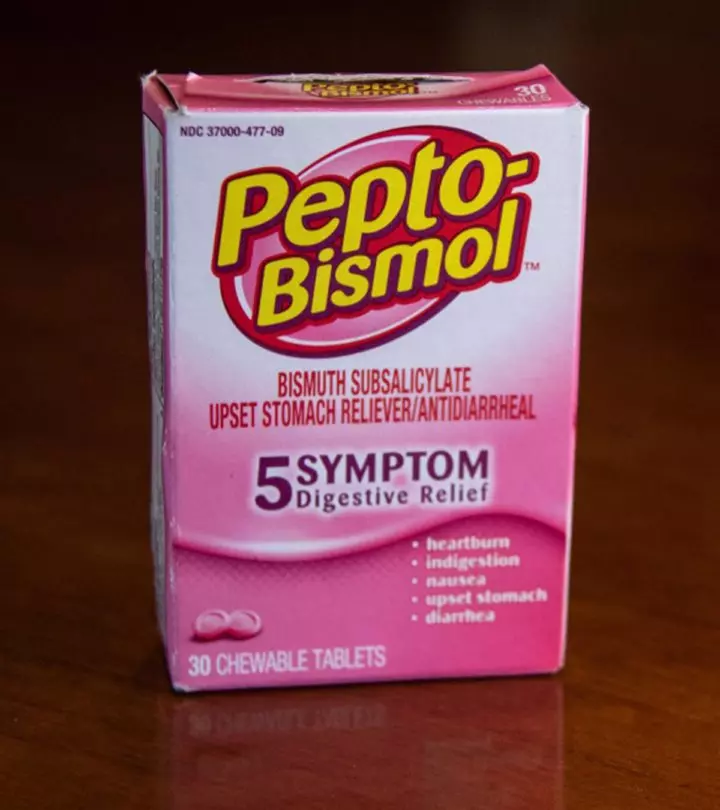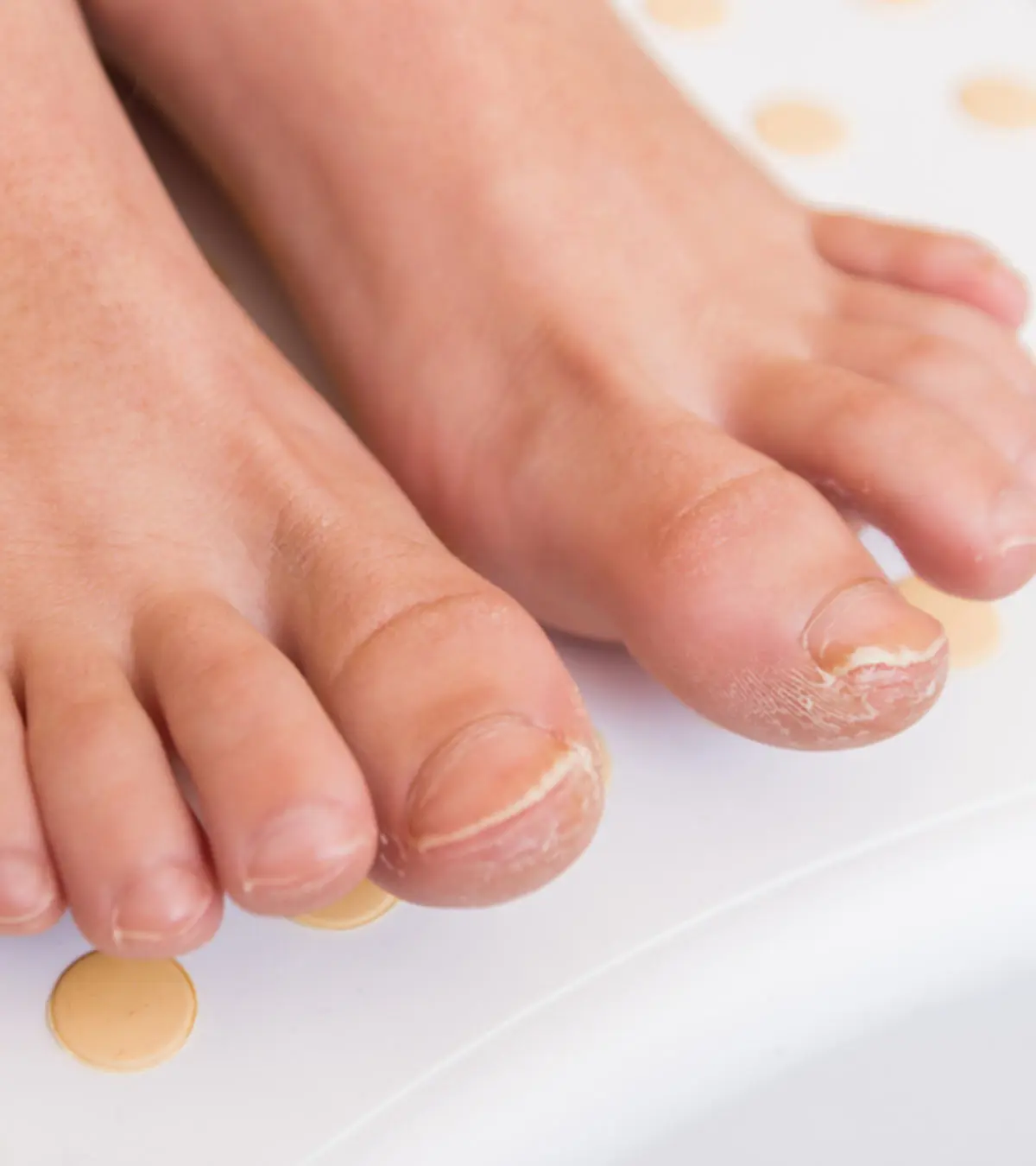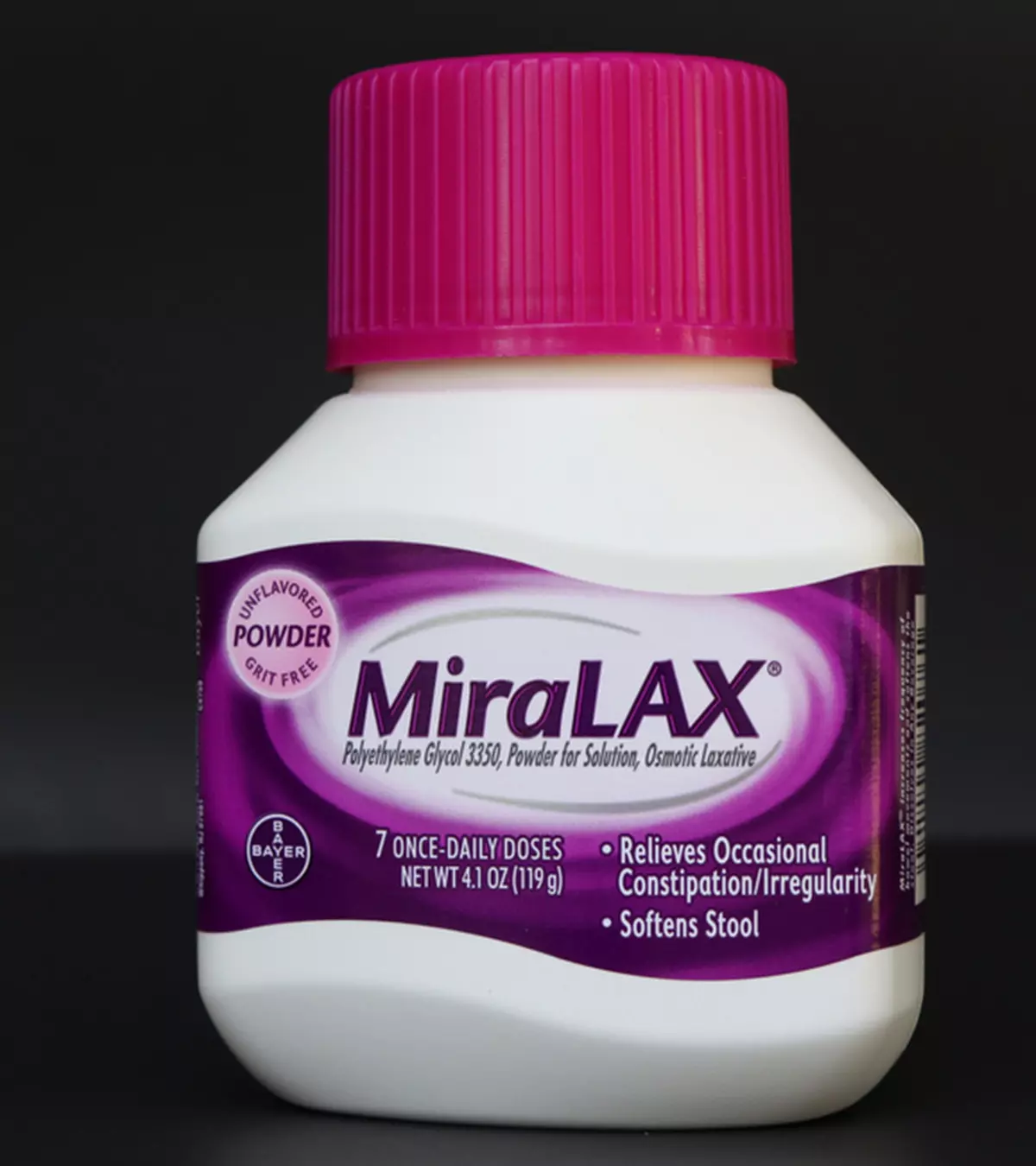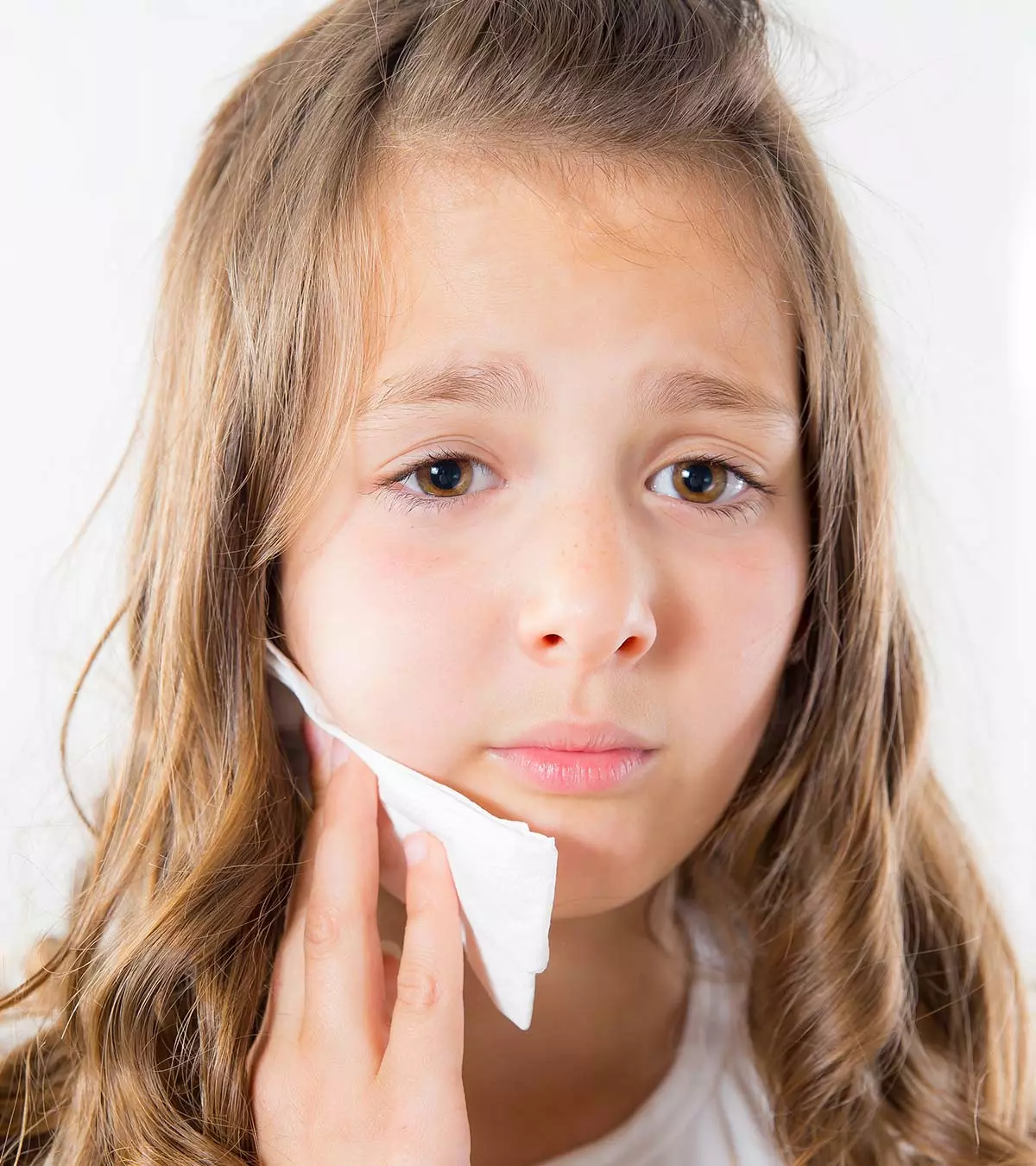
Image: Shutterstock
Body odor in teens is not uncommon and maybe a common complaint after puberty. While teenagers may have issues with self-confidence, self-esteem, and social acceptance due to body odor, it may help to know that it is normal and does not always indicate an underlying pathology (1). The condition is more common in teenage boys than girls. Sweating is often the main reason for body odor, but there may be other reasons. Understanding the causes of body odor during adolescence is important for effective management. Read the post to learn about the causes, management, and signs you need to see a doctor for body odor.
Key Pointers
- Body odor in teenagers is common and is primarily caused by excessive sweating.
- Hormonal changes, poor hygiene, dietary habits, and medical conditions can also affect body odor in teens.
- Regular bathing, wearing clean clothes, and using deodorants can help control body odor in teens.
- Other helpful strategies include limiting certain foods, using natural remedies such as apple cider vinegar, and applying natural deodorants.
- Teens with chronic body odor or related symptoms, such as severe itching, should consult a doctor.
Possible Causes Of Body Odor In Teens
Excessive sweating (hyperhidrosis) is the primary reason for body odor in teens. This is due to overactive sweat glands. Besides that, some of the common reasons for teenage body odor could be:
- Hormonal changes: During and after puberty, hormones rise and cause increased secretion by the sweat and oil glandsiAlso known as sebaceous glands, microscopic organs present in the skin that lubricates the skin. . The sweat produced by eccrine and apocrine glands is odorless. But bacteria on the skin surface decompose the sweat into ammonia and fatty acids that emit a peculiar or pungent odor (2). Talking about when children typically have body odor, Kathryn Schaus, MD, a pediatrician at Marshfield Children’s Hospital says, “Body odor signaling the start of puberty can start as early as age 7 for girls and age 9 for boys (3).”
- Poor hygiene: Not bathing or changing clothes regularly can cause excess bacteria to accumulate on the skin, especially in the underarms, groins, and on the feet. It increases the possibility of developing body odor (3).

- Food choices: Consumption of certain foods such as strongly-flavored spices, garlic, milk-based products, fish, soya beans, and plants from Brassicaceae or AlliaceaeiFamily of common vegetables like onion, shallot, garlic, cabbage, cauliflower, and broccoli. families may cause distinct body odors (4). However, this is not just specific to teens but for children and adults too.
- Bromhidrosis: It occurs when the skin bacteria interact with sweat and break it down into malodorousiUnpleasant smell. compounds, thus causing body odor (5). This condition usually occurs in the palms, soles, and skin folds.
- Trimethylaminuria: It is also called fish odor syndrome, and may occur in teenagers and adults. The condition occurs when the body is unable to process trimethylamine, a compound naturally produced within the body. Accumulation of trimethylamine in the body causes a fish-like odor to develop in the person’s urine, breath, and sweat (6).
- Premature adrenarche: It is when the adrenal glands attain maturity earlier than normal. It can cause the teen to develop body odor (7).
- Infections: Several fungal and bacterial infections can cause the imbalance of bacteria on the skin, leading to a foul smell. Giving an example of such an infection, Maureen Theresa Butler, MD, a family medicine physician at Northwestern Medicine says, “Athlete’s foot is an example of a fungal skin infection and typically happens when your feet sweat inside shoes or socks. This creates an environment where fungus can flourish (8).”
- Superadded infections: Scabies is common in the underarms or groins. This causes intense itching and a body odor. There may be superadded bacterial infections, which teens tend to hide. The underarms should be carefully examined.
- Phenylketonuria: It is a condition whereby the body doesn’t process phenylalanineiAn essential aromatic amino acid in humans that plays a vital role in the structure and functioning of many proteins and enzymes. and excretes it in the urine or sweat. This is a mousy smell. This disorder is detected in newborns after birth, but is extremely rare. In a comprehensive study, researchers from the Kerman University of Medical Sciences (Iran) observed that the global incidence of this condition is approximately six cases per 100,000 newborns (9). However, if a child is diagnosed with the disorder, they should avoid consuming meat or protein.
- Stress: Stress and anxiety in teens can make them sweat more, leading to a foul body smell. Thus, teach your teens to manage their stress effectively (10).
How To Get Rid Of Teenage Body Odor?
If you are experiencing body odor, it is important for you to follow the right cleanliness habits with personal grooming and self-care routines for effective perspiration control.
Take a healthy diet and be well-hydrated. In addition to that, here are some body odor prevention tips you may follow (8) (10):
- Shower with antibacterial soap: Maintaining personal hygiene for teenagers is extremely important to tackle issues like body odor. Regular body wash, as part of adolescent hygiene, with antibacterial soap and washing parts like armpits, groin, and feet could remove sweat and cease body odor-causing bacterial growth.

- Wear clean clothes: Wearing clean cotton clothes (including inners, t-shirts, and socks) and removing perspiration-soaked garments as soon as possible could help reduce and eliminate body odor as they are breathable and absorb sweat. Materials such as rayon, silk, and polyester are not breathable and may cause more perspiration. You may also opt for moisture-wicking socks made of cotton for your teens. Dr. Kathryn Schaus says, “It’s essential that kids wear fresh underwear, socks, and other clothing daily because sweaty clothes can harbor bacteria and cause odor (11).”
- Deodorants: Try applying a deodorant as it may cover or block the body odor, while antiperspirants dry up or prevent sweating. Antiperspirants containing aluminum zirconium and aluminum chloride are considered effective (8). Additionally, you may also try out perfume/cologne to block the odor from stinky armpits.
- Cutting down certain foods: To gain control of sweating excessively, try limiting strong-flavored and strong-smelling foods such as garlic, fish, and spices may help reduce body odor.
A student and a blogger named Jax shares his experience of body odor and how diet helped him. He says, “The first time I controlled my diet was when I was still in college. At that time my odor got a lot worse, and even taking multiple showers did not help anymore…
“I decided to only eat fruits and vegetables(mainly fruit), because I believed in the notion that I was smelling because I was eating processed foods that was putrefying inside me and expelling from my body. I was trying to follow the alkaline diet because I thought my body was too acidic which was the cause of my odor problems. At the time when I changed my diet in college it was near the end of the semester. I continued to eat the fruit that I stocked up on from the food court daily. I also did other things like running, and taking vitamin supplements that supposedly helped body odor(vitamin C, magnesium, vitamin B). And eventually I stopped smelling bad to people (i).”
You may even try some home remedies for body odor in teens.
- Apple cider vinegar: Anecdotal evidence suggests that apple cider vinegar can adjust the pH level of the skin, thereby eliminating the odor. However, it should be diluted in water and applied using cotton on the armpits (10). For foot odor, soak the feet in warm water (with one part of apple cider vinegar) for about 15 minutes.
- Epsom salt: Soaking feet in Epsom salt may also help in reducing foot odor (12).
 Quick tip
Quick tip- Wheatgrass juice: According to the International Journal of Chemical Studies, wheatgrass juice is known to have odor-reducing properties (13). Thus, its consumption may help to get rid of body odor.
- Natural deodorants: Some natural alternatives to deodorants include lemon juice (can kill bacteria causing odor), coconut oil (antibacterial properties), and baking soda (neutralizing odor). These can be applied topically or mixed with some more ingredients to make a homemade deodorant (14).
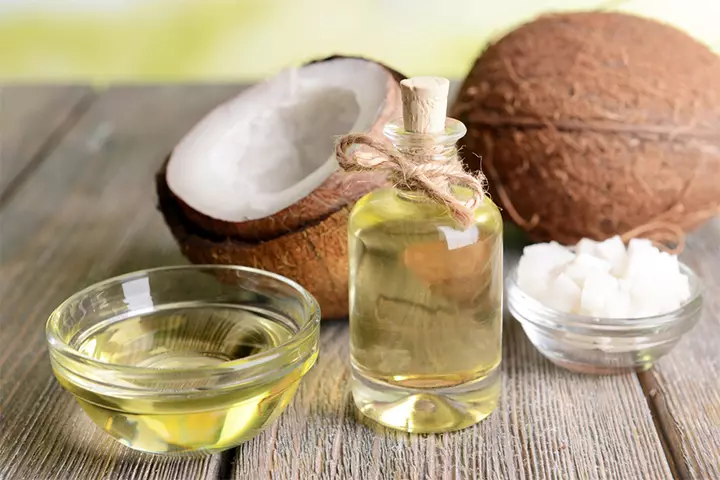
We have a DIY method to make a deodorant on your own.
You would require:
- 3tbsp baking soda
- 3tbsp organic corn starch
- 3tbsp organic extra virgin olive oil
- 1tbsp natural beeswax
- 20 drops essential oil (any with antibacterial properties)
- Container
Method:
- Use a double boiler dish to melt the beeswax
- Once the beeswax starts to melt, add all the other ingredients
- Stir well by adding oil
- Once the blend is mixed well, add essential oil
- Pour the mixture in one container for use
These remedies are a good way to control body odor at home. Test the remedy on a small part of the skin to know if it suits your body.
 Quick tip
Quick tipWhen To See Doctor?
If body odor continues despite good hygiene practices or is accompanied by other symptoms such as excessive sweating or skin changes, it is important to consult a doctor for further evaluation. Also, see a doctor if these home remedies do not provide any relief. If the teen sweats excessively and already has another medical condition, then it becomes essential to visit a doctor.
Frequently Asked Questions
1. Does puberty increase body odor?
The sweat and perspiration from sweat glands contribute to body odor. Due to the onset of puberty, these glands become more active and start secreting various chemicals into a sweat, which results in a stronger smelling body odor (17).
2. Does body odor in teens indicate illness?
Yes. Sometimes the body odor in teens can be a symptom of illnesses such as diabetes and liver or kidney disease. Excessive sweating in a teen could indicate hyperhidrosis. If you notice these changes, consult your child’s doctor immediately (13).
3. What essential oils can teens use to reduce body odor?
Cedarwood, lavender, tea tree, and cypress oil are a few essential oils that can help eliminate body odor. However, essential oils may have potential side effects and individual sensitivities. Therefore, speaking to an aromatherapy expert before using essential oil is vital to ensure their safety and efficacy.
4. Can low estrogen or progesterone levels cause body odor?
Pediatrician Dr. Supriya Wakchaure says, “Estrogen, a female hormone, does not directly lead to body odor. However, estrogen levels may rise during puberty and then drop before stabilizing, potentially causing fluctuations in sweat and oil production. This hormonal imbalance may contribute to temporary body odor. Progesterone is another hormone that can fluctuate during puberty and may simulate body odor. However, as with estrogen, this should be regulated over time and not be a persistent issue.”
5. How can parents effectively talk to their teens about body odor?
Parents should handle this topic with care, ensuring their teens understand that body odor is a natural aspect of puberty. Engaging in open conversations about hygiene practices and the necessity of regular bathing can help reduce embarrassment and promote healthy habits.
Body odor in teens usually arises from causes that are not benigniLikely not harmful. . It may result from hormonal changes, hygiene issues, food choices, or some other treatable medical conditions. Body odor can be mainly managed by certain lifestyle changes such as changing clothes frequently, deodorants, bathing regularly, and cutting down on certain foods that may lead to foul body odor. Some home remedies can also help curb body odor. Excessive sweating and persistent foul odor can indicate a need for medical attention.
Infographic: How To Talk To Teens About Body Odor?
Parents should educate their teens about body odor and personal hygiene. You should explain the changes in body odor and ways to manage it. Go through the infographic to learn more about how to discuss body odor with teens. Illustration: Momjunction Design Team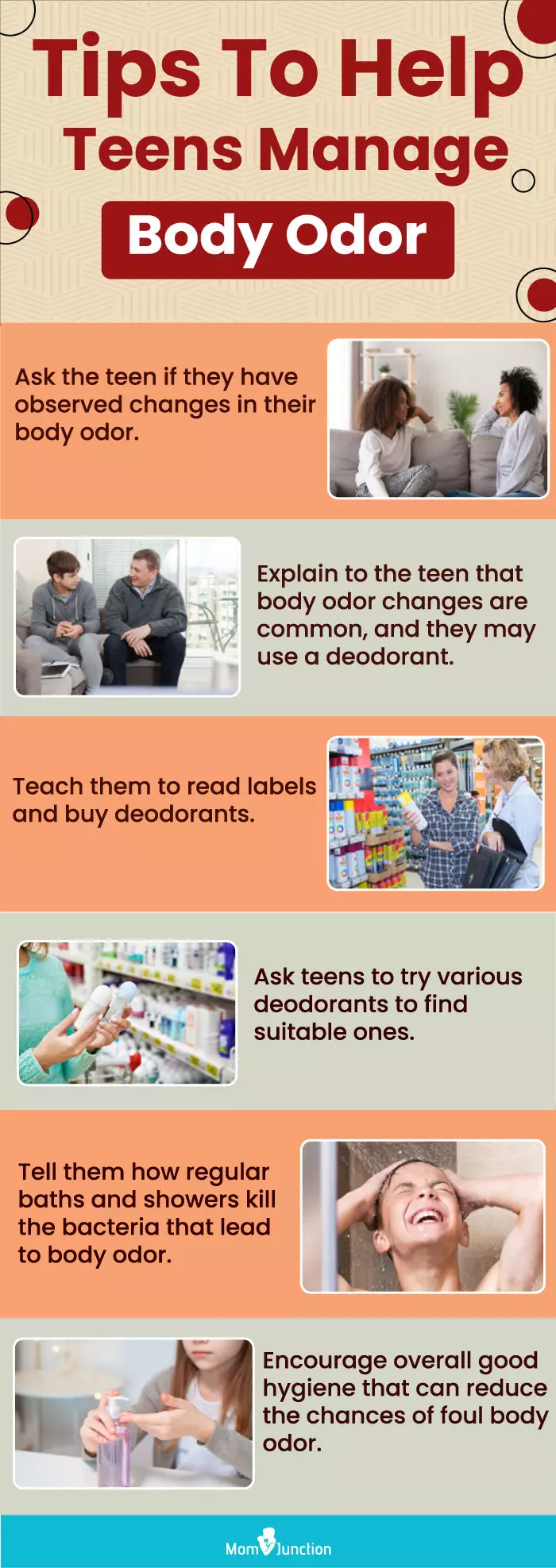
Illustration: Preventive Measures To Get Rid Of Body Odor In Teens

Image: Dall·E/MomJunction Design Team
Let’s have an important conversation about puberty, body odor, and other changes, and discover how to confidently manage these transformations with the help of this video.
Personal Experience: Source
MomJunction articles include first-hand experiences to provide you with better insights through real-life narratives. Here are the sources of personal accounts referenced in this article.
i. The Bromhidrosis, Leaky gas,Fecal body odor…Blog;https://yousmellstank.blogspot.com/
References:
- Smells like teens and tweens, How to deal with body odor; Children’s Wisconsin
https://childrenswi.org/at-every-turn/stories/teen-body-odor#:~:text=Your%20child’s%20hormones%20are%20changing,that%20live%20on%20our%20skin. - S. R. Patel, An External and Internal Understanding: Female Puberty; University of Tennessee (2019)
https://trace.tennessee.edu/cgi/viewcontent.cgi?article=3349&context=utk_chanhonoproj - What’s that smell? Body odor change means puberty is starting; Shine365; Marshfield Clinic Health System
https://shine365.marshfieldclinic.org/kids-health/body-odor/ - J. Havlicek and T. Saxton, The Effect Of Diet On Human Bodily Odors; Nova Science Publishers Incorporation (2009)
https://www.semanticscholar.org/paper/The-effect-of-diet-on-human-bodily-odors-Havl%C3%AD%C4%8Dek-Saxton/338e97c846eed3387e19b99169db76df713be13a?p2df - E. Langenau, Chapter 180: Odor (Unusual Urine and Body); Pediatric Care Online
https://pediatriccare.solutions.aap.org/chapter.aspx?sectionid=108725838&bookid=1626 - Trimethylaminuria; National Organization for Rare Disorders
https://rarediseases.org/rare-diseases/trimethylaminuria/ - Premature Adrenarche; Boston Children’s Hospital
https://www.childrenshospital.org/conditions/premature-adrenarche - Body Odor: A Window to Your Health; Northwestern Medicine
https://www.nm.org/healthbeat/healthy-tips/body-odor-a-window-to-your-health - Hamid Reza Shoraka et al.; Global prevalence of classic phenylketonuria based on Neonatal Screening Program Data: systematic review and meta-analysis; Clinical and experimental pediatrics (2020)
https://pmc.ncbi.nlm.nih.gov/articles/PMC7029670/ - Body Odor; Cleveland Clinic
https://my.clevelandclinic.org/health/symptoms/17865-body-odor - What’s that smell? Body odor change means puberty is starting; shin365; Marshfield Clinic Health System
https://shine365.marshfieldclinic.org/kids-health/body-odor/ - 5 Reasons to Soak Your Feet in Epsom Salt; Epsom Salt Council
https://www.epsomsaltcouncil.org/health/five-reasons-to-soak-feet-in-epsom-salt/ - M. Chauhan; A pilot study on wheat grass juice for its phytochemical, nutritional and therapeutic potential on chronic diseases; International Journal of Chemical Studies (2014)
https://www.semanticscholar.org/paper/A-pilot-study-on-wheat-grass-juice-for-its-and-on-Chauhan/73f2bb7c0b1129b5da66ca284eb2294d956fa9d2?p2df - Natural Alternatives to Deodorant; A Healthier Michigan
https://www.ahealthiermichigan.org/2018/08/03/natural-alternatives-to-deodorant - Smells like teens and tweens: How to deal with body odor; Children’s Wisconsin
https://childrenswi.org/at-every-turn/stories/teen-body-odor - Sniffing Out Solutions to Pre-Teen Body Odor; Children’s Hospital Los Angeles
https://www.chla.org/blog/rn-remedies/sniffing-out-solutions-pre-teen-body-odor - Hygiene Basics; Children’s Health System
https://kidshealth.org/en/teens/hygiene-basics.html
Community Experiences
Join the conversation and become a part of our nurturing community! Share your stories, experiences, and insights to connect with fellow parents.
Read full bio of Dr. Mubina Agboatwalla
- Dr. Supriya Wakchaure is a pediatrician with about 12 years of experience. She is a member of the Indian Academy of Pediatrics and works as a consulting pediatrician and neonatologist at Matoshree Multispeciality Hospital, Mumbai.
 Dr. Supriya Wakchaure is a pediatrician with about 12 years of experience. She is a member of the Indian Academy of Pediatrics and works as a consulting pediatrician and neonatologist at Matoshree Multispeciality Hospital, Mumbai.
Dr. Supriya Wakchaure is a pediatrician with about 12 years of experience. She is a member of the Indian Academy of Pediatrics and works as a consulting pediatrician and neonatologist at Matoshree Multispeciality Hospital, Mumbai.
Read full bio of Dr. Ritika Shah
Read full bio of Swati Patwal
Read full bio of Ghazia Shah








